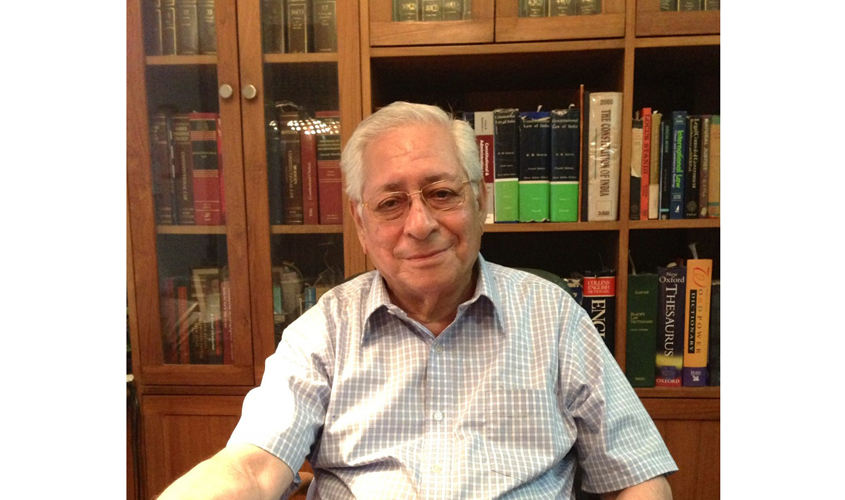Distinguished jurist Soli Sorabjee’s continuation as the president of New Delhi’s prestigious India International Centre became untenable after eminent senior members questioned the validity of the poll process to grant him a fresh term and declined to endorse the director’s report at the annual general body meeting on Friday. Sorabjee, who was presiding over the meeting, was compelled to adjourn the proceedings when it became evident that the members were incensed due to the apparent deviation from the accepted procedure to elect the president. They were also infuriated over the decision of arbitrarily halting the counting of votes for the election of a trustee, plus two members of the managing committee and demanded that a proper thorough inquiry should be held into the matter.
Sorabjee initially attempted to placate the members by repeatedly describing their observations as “suggestions”, but finally bowed to the overall mood of the house, vocalised by the views expressed amongst others by Sanjaya Baru, Pawan Verma, Deepak Nayyar, Commodore Uday Bhaskar, Sumit Chakravarty, Sagari Chabra, Vishwabandhu Gupta, S.P. Narang, Vinod Sharma and Om Thanvi. Earlier, IIC trustee and cultural czarina, Kapila Vatsyayan pointed out that the director’s report in respect of the president’s election was inaccurate and therefore she could not accept it. Her statement drew an overall applause and lent ammunition to the sharp attack by those who were questioning Sorabjee’s continuation for another term in contravention of the accepted convention. Sorabjee tried to convince the members that Dr Vatsyayan was a party to the collective decision by the trustees, but to no avail.
Quoting from the Memorandum of Association of the IIC, Sumit Chakravarty brought to light that unless the fifth trustee was elected to fill in the vacancy caused by the passing away of past president and noted scientist, Prof. M.G.K. Menon, the president’s election could not have been held. His views were echoed by some others who termed Sorabjee’s election as null and void in the wake of the procedural lapse.
Questions were raised over the presence of Dr R.K. Pachauri at a meeting of the trustees, since he had ceased to represent TERI on the board post his resignation from that organisation. Members wanted to know, why in the first place, was he present at the meeting?
Prof Deepak Nayyar said that in his over 40-year-long association with the IIC, he had never seen such an acrimony and it would be in the fitness of things if the proceedings of the AGM were adjourned till the queries of members could be transparently and satisfactorily addressed. Ambassador Pawan Verma emphasised that substantive issues were raised in the meeting and keeping in mind the high standards and values attached to the functioning of the IIC, the president, who is himself a champion of justice and fair play, should take cognisance and adjourn the meeting.
Vinod Sharma summed up the mood stating that there were two elections which were in dispute. One pertaining to that of the president himself and the other regarding the managing committee and that of a trustee. Therefore, Soli Sorabjee should clear the air and adjourn the proceedings. Several members also raised doubts over the manner in which membership had been granted to innumerable people, who, according to them, did not adequately qualify to be members of this institution. It was demanded that a list of those who had been admitted must be put on the IIC’s website as well as on the notice board.
The fallout of the adjourned annual general body meeting is that Sorabjee will have no option but to step down as the president to enable the IIC to conduct the elections through the correct procedure. To begin with, Dr Kapila Vatsyayan being the senior most trustee, shall have to write to the secretary of the trust to convene a meeting for inducting a new trustee in place of Prof Menon. Once that is done, then the trustees, through their collective wisdom, would elect the new president. At present, the four trustees are Vatsyayan, Soli Sorabjee, N.N. Vohra and Justice B.N. Srikrishna. The IIC president has always been elected through the principle of rotation amongst the trustees and after Sorabjee’s tenure came to an end, the natural corollary was that it should have gone to N.N. Vohra as per the established convention. However, Sorabjee was elected through a flawed process, which did not get the members’ approval at the AGM. The other implication of Friday’s meeting is that the terms of Vipin Malik, an elected trustee and two members of the managing committee, Suhas Borkar and Shanta Sarabjeet Singh have ended, with their vacancies yet to be filled since the poll process was put on hold midway. An inquiry committee headed by Justice J.K. Mehra has been set up to go into several issues arising due to the disruption of counting.
It is more than obvious that there are ripping differences within the Board of Trustees. The second term of Soli Sorabjee ended on 31 December 2016 and Vatsyayan wrote to him appreciating his work and stating that it was time for N.N. Vohra to take over from 1 January 2017. Her suggestion was based on the long term practice in the IIC for the succeeding presidents being appointed on the basis of principle of rotation. However, N.N. Vohra was overlooked on the plea that individual trustees did not appoint the president and “a person cannot discharge the functions of president of IIC by remote control”, alluding to the fact that N.N. Vohra, being the Governor of Jammu and Kashmir, would not be present in Delhi.
IIC’s senior members recalled that N.N. Vohra’s being in Srinagar should not have come in his way since there was a past precedent pertaining to Dr C.D. Deshmukh. After he had settled down in Hyderabad, Deshmukh continued to be assisted by Kamladevi Chattopadhya and Prof M.G.K. Menon who served successively as vice presidents. Thus, the suspense over the future appointments would for the time being continue.

